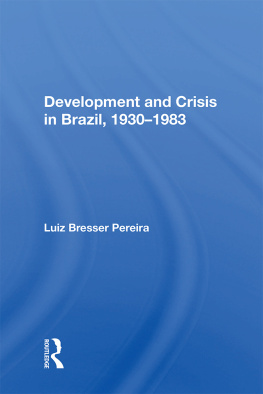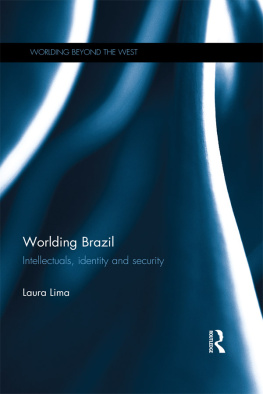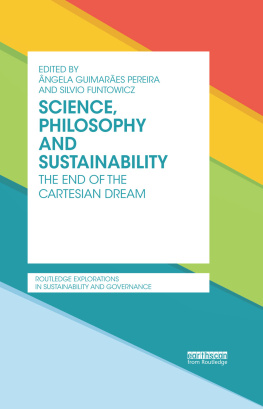Development and Crisis in Brazil, 1930-1983
Also of Interest
Authoritarian Capitalism: Brazil's Contemporary Economic and Political Development , edited by Thomas C. Bruneau and Philippe Faucher
Brazil: A Political Analysis, Peter Flynn
International Politics and the Sea: The Case of Brazil, Michael A. Morris
Brazil in the International System: The Rise of a Middle Power, edited by Wayne A. Selcher
The Dilemma of Amazonian Development, edited by Emilio F. Moran Controlling Latin American Conflicts: Ten Approaches, edited by Michael A. Morris and Victor Milln
Latin America and the U.S. National Interest: A Basis for U.S. Foreign Policy, Margaret Daly Hayes
Development Strategies and Basic Needs in Latin America, edited by Claes Brundenius and Mats Lundahl
Technological Progress in Latin America: The Prospects for Overcoming Dependency, edited by James H. Street and Dilmus D. James
FOREIGN POLICY on Latin America, 1970-1980, edited by the staff of Foreign Policy
The Exclusive Economic Zone: A Latin American Perspective, edited by Francisco Orrego Vicua
Dependency and Marxism: Toward a Resolution of the Debate, edited by Ronald H. Chilcote
Post-Revolutionary Peru: The Politics of Transformation, edited by Stephen M. Gorman
Corporatism and National Development in Latin America, Howard J. Wiarda
Available in hardcover and paperback.
Westview Special Studies on Latin America and the Caribbean
Development and Crisis in Brazil, 1930-1983
Luiz Bresser Pereira
In this first English-language edition of a book that has seen thirteen printings in Brazil, Dr. Bresser Pereira analyzes Brazil's economy and politics from 1930, when the Brazilian industrial revolution began, up to July 1983. First addressing the period of strong development in Brazil between 1930 and 1961, he discusses at length the import-substitution model of industrialization; the emergence of new classesindustrialists, industrial workers, and especially the new technobureaucratic middle classes; the conflict between the traditional agrarian ideologies of coffee planters and the nationalistic and industrializing ideologies of the new classes; and the new realities of the 1950s that led to the crisis of the populist alliance between the industrial bourgeoisie and the workers. Next he explores the economic and political crisis of the sixties, centering on the Revolution of 1964, when an industrialized and fully capitalist but still underdevelopedBrazil experienced the cyclical movements of capitalism. The final chapters of the book examine the Brazilian "miracle" of 1967-1973, the economic slowdown of the 1970s that culminated in the severe recession of 1981, the dialectics between the process of abertura led by the military regime established in 1964 and the redemocratization process demanded by civil society, and the "total crisis of 1983."
Dr. Luiz Bresser Pereira is professor of economics at Fundao Getlio Vargas in So Paulo and president of Banespa (Bank of the State of So Paulo). He has written nine scholarly books and is the editor of Revista de Economica Poltica. For twenty years he was the administrative vice-president of Po de Acar S.A., one of the most important commercial enterprises in Brazil.
First published 1984 by Westview Press, Inc.
Published 2018 by Routledge
52 Vanderbilt Avenue, New York, NY 10017
2 Park Square, Milton Park, Abingdon, Oxon OX14 4RN
Routledge is an imprint of the Taylor & Francis Group, an informa business
Copyright 1984 Taylor & Francis
All rights reserved. No part of this book may be reprinted or reproduced or utilised in any form or by any electronic, mechanical, or other means, now known or hereafter invented, including photocopying and recording, or in any information storage or retrieval system, without permission in writing from the publishers.
Notice:
Product or corporate names may be trademarks or registered trademarks, and are used only for identification and explanation without intent to infringe.
Library of Congress Cataloging in Publication Data
Pereira, Luiz Carlos Bresser.
Development and crisis in Brazil, 1930-1983.
(Westview special studies on Latin America and the Caribbean)
Includes bibliographical references and index.
1. BrazilEconomic conditions1918- .
2. BrazilEconomic policy. 3. Industry and stateBrazilHistory20th century.
4. BrazilPolitics and government20th century. I. Title. II. Series.
HC187.P392213 1984 338.981 83-10232
ISBN 13: 978-0-367-01978-5 (hbk)
In late March of 1983 four days of extensive rioting took place in the city of So Paulo protesting the high rate of unemployment, sharply increased cost of living, and other current inequities of the socioeconomic crisis confronting Brazil. These were the most serious riots in Brazil since the military took power in 1964 and are particularly important as evidence that the economic crisis of high foreign indebtedness ($85 billion), high inflation (100 percent in 1982), and rapidly increasing unemployment is having its impact on the population. The rioting occurred just two weeks after Franco Montoro of the opposition PMDB [Party of the Brazilian Democratic Movement] was installed as governor of the state of So Paulo. In nine other states, out of a total of twenty-two, opposition governors took office. The elections on 15 November 1982 that empowered these twenty-two governors were the first direct elections for governors since 1965 and as such are considered a key feature of the current transition toward democracy in Brazil. It is important to note that the ten opposition governors assumed office in states with 58 percent of the country's population and 75 percent of the Gross National Product. The riots took place during an economic and social crisis that both encouraged the beginning of the transition and at the same time places limits on its continuation.
There is no better time to publish the first English-language edition of Development and Crisis in Brazil, by Luiz Bresser Pereira, and no better book for understanding the crisis and concomitant period of transition. There have been thirteen Portuguese editions of the book since it was first published in 1968, and it has been rewritten and updated periodically as the economy and polity have been transformed in Brazil. Through these revisions Bresser Pereira has engaged in the national debate on the causes and limitations of Brazil's development; thus the reader obtains not only information and analysis on the processes of development, but also an insight into the various positions Brazilian intellectuals have assumed vis--vis these processes. The great success of the book in Brazil is undoubtedly due to the fact that Bresser Pereira successfully integrates a great deal of material in offering a synthesis of the economic, political, and social nature of this development and also seeks to analyze it by means of an innovative neo-Marxist perspective. Little of what follows is doctrinaire, however, and one finds as much information on politics and political actors as on the economy and international constraints. Informed by this flexible perspective, the book is in fact comprehensive and insightful.












